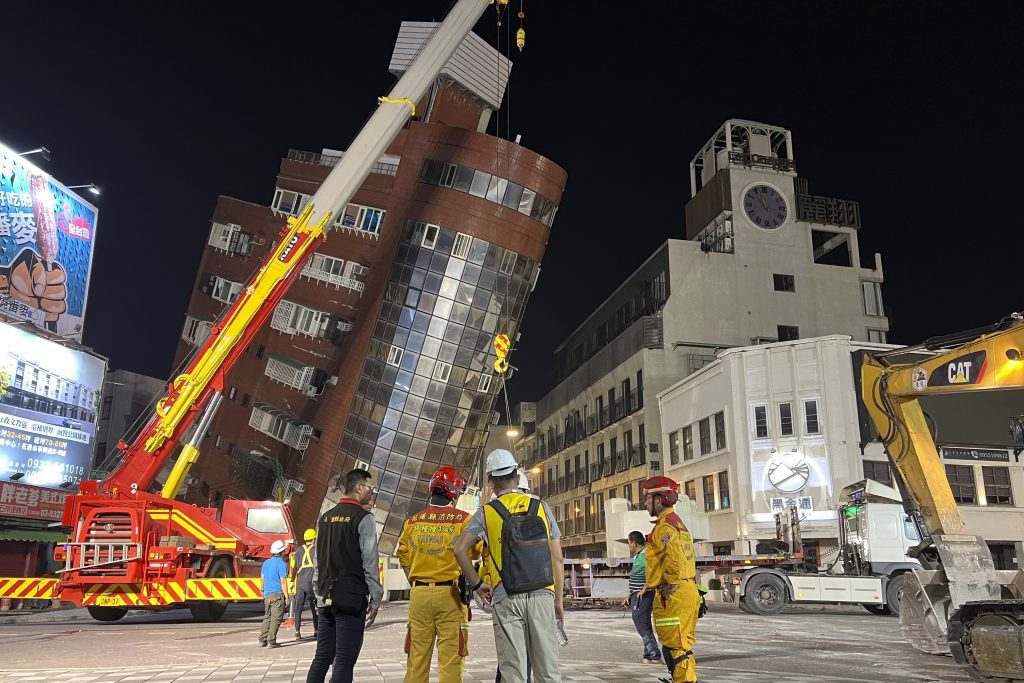The most powerful earthquake in 25 years hit Taiwan on Wednesday morning, killing nine people, causing some to escape through damaged windows, and stopping train service across the island. A warning for a tsunami was issued but later canceled. The earthquake happened off the coast of Hualien County, leaving buildings tilted and collapsed, and causing damage to structures in Taipei, 150 kilometers away.
Television footage showed residents and rescue workers helping people, including a young child, out of buildings through windows after doors became stuck during the shaking. No serious injuries were reported.
Taiwan frequently experiences earthquakes and is well-prepared, but this one was stronger than expected, causing fear even among those accustomed to quakes.
A resident of Taipei, Hsien-hsuen Keng, said that despite being used to earthquakes, this was the first time he felt so scared.
The earthquake resulted in nine deaths, including three hikers and a van driver, with 934 people injured and dozens missing or trapped in various locations across the affected area.

View image in full screen
TVBS via AP
According to Taiwan’s national fire agency, nine people perished in the earthquake, including hikers in rockslides in Taroko National Park and a van driver struck by boulders.
In addition to the fatalities, 934 individuals were injured, 50 were unaccounted for in minibuses in the national park, and six were trapped in a coal mine.
The quake and subsequent aftershocks caused 24 landslides and damage to 35 roads, bridges, and tunnels.
Taiwan’s earthquake monitoring agency recorded the quake as 7.2 magnitude, while the U.S. Geological Survey measured it at 7.4. It originated off the coast of Hualien and was 35 kilometers deep, followed by multiple aftershocks.
The national legislature, a former school constructed before World War II, and parts of the main airport in Taoyuan, south of Taipei, were slightly damaged.

View image in full screen
AP Photo/Johnson Lai
Following the earthquake, traffic along the east coast came to a standstill due to landslides and debris hitting tunnels and highways. Train and subway service was suspended across the island, with tracks and infrastructure affected.
The initial fear after the earthquake quickly disappeared on the island, which gets ready for such events with practice runs at schools and notices sent out through public media and mobile phones. Stephen Gao, a scientist who studies earthquakes and teaches at Missouri University of Science and Technology, said Taiwan's preparedness is among the most advanced in the world, also having strict rules for constructing buildings and a top-notch system for studying earthquakes.
By midday, the subway station in the busy northern Taipei suburb of Beitou was once again filled with people going to work and others arriving to visit the geothermal springs or hike the mountain trails at the base of an inactive volcano.
The earthquake was felt in Shanghai and several provinces along China's southeastern coast, according to Chinese media. China and Taiwan are about 160 kilometers (100 miles) apart.
The Japan Meteorological Agency said a tsunami of 30 centimeters (about 1 foot) was spotted on the coast of Yonaguni island about 15 minutes after the earthquake struck. Smaller waves were measured in Ishigaki and Miyako islands. All warnings in the area had been canceled by Wednesday afternoon.

View image in full screen
TVBS via AP
Taiwan is situated along the Pacific “Ring of Fire,” the line of seismic faults encircling the Pacific Ocean where most of the world's earthquakes occur.
Hualien was last hit by a deadly earthquake in 2018 that killed 17 people and brought down a historic hotel. Taiwan's most severe earthquake in recent years happened on Sept. 21, 1999, with a magnitude of 7.7, causing 2,400 deaths, injuring around 100,000, and destroying thousands of buildings.
The economic impact of the earthquake has not yet been calculated, but Taiwan is the leading producer of the world's most advanced computer chips and other high-tech items that are highly affected by seismic events. Parts of the power grid were shut down, which could lead to disruptions in the supply chain and financial losses.
Taiwanese chipmaker TSMC, which provides semiconductors to companies like Apple, said it relocated employees from some of its factories in Hsinchu, southwest of Taipei. Hsinchu authorities said water and electricity supplies for all the factories in the city's science park were functioning as normal.
The Taiwan stock exchange opened as usual on Wednesday, with the index fluctuating between losses and gains.



